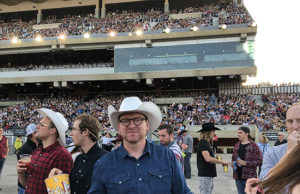Branding in healthcare can be important as long as principles go beyond slogans and into practice, says Peter Brindley
 The Calgary Stampede is a ten-day annual “yahoo” in the Canadian Province that I am proud to call home. A patient recently gave me a plate-sized silver belt buckle and, like me, it deserved a day out. I oiled my cowboy boots, popped a Stetson on my head, and grunted into my tightest jeans. I had a fabulous time and was reminded that life is better when you get out onto the (metaphorical) dancefloor. Alberta is suffering economically, but a few days of western-exuberance renewed my love for this resilient place. The drive home also gave me time to think. The Stampede guarantees everyone a hearty welcome; public healthcare less so. This event unashamedly bills itself as the “Greatest Outdoor Show on Earth”; so how would I promote my workplace?
The Calgary Stampede is a ten-day annual “yahoo” in the Canadian Province that I am proud to call home. A patient recently gave me a plate-sized silver belt buckle and, like me, it deserved a day out. I oiled my cowboy boots, popped a Stetson on my head, and grunted into my tightest jeans. I had a fabulous time and was reminded that life is better when you get out onto the (metaphorical) dancefloor. Alberta is suffering economically, but a few days of western-exuberance renewed my love for this resilient place. The drive home also gave me time to think. The Stampede guarantees everyone a hearty welcome; public healthcare less so. This event unashamedly bills itself as the “Greatest Outdoor Show on Earth”; so how would I promote my workplace?
This question of how to further our specialty was front and centre as Canada’s critical care medicine doctors met in Calgary. We concluded that, unlike cowboys and cowgirls, we do not know how to brand. Job-one for us is caring for the sick and this is as it should be. However, because care requires cash, we also need to craft a compelling story. We also concluded that Rodeo is easy to judge; whereas healthcare is not. Bull riding lasts for eight seconds during which you either stay on or fall off. If you’re the best you immediately win a prize; if you are no good then you get squashed.
While I was “playing cowboy”, my Faculty was finalizing its search for a new Dean. My hospital is also in the midst of renewing its vision and mission. Even if times are tough, and funds are limited, energy is being put into re-engaging staff and funders. Most university hospitals already have a motto that boasts of being at the forefront of caring, teaching, and discovering. I will be especially proud if my hospital’s motto also includes words like compassion, humility, and the explicit commitment to be there when patients need us most.
Taking time away from clinical care for branding could be seen as indulgent and wasteful. After all, some days we do nothing more aspirational than keep the train on the track. However, I support efforts to provide everyone with a greater sense of why. The best organisations make you feel part of something meaningful and bigger than yourself. Reportedly, President Kennedy asked a member of the cleaning staff what he was doing while touring the space centre: “helping to put a man on the moon, Mr. President” was the reply. Count me in if wordsmithing helps deliver the moonshots that healthcare needs. Count me out if those words are not backed up by deeds.
If an academic hospital gets it right then research and education help to create the secret sauce of cutting-edge care and perpetual improvement. In turn, these become nodes where the energetic want to work and the sick want to be treated. But there is also the possibility that academic hospitals can lose the plot. Patients can be made to feel like research guinea pigs, and that their basic clinical needs are a nuisance rather than the main event. I work with superb professionals but there are times when we academics deliver little more than pessimism and arrogance. A colleague who eschewed the ivory tower summarized this by wryly suggesting our motto could be “no you can’t and we’re better than you”. His point is that it is easy to call yourself a “centre of excellence;” much tougher to deliver this 24/7/365.
Healthcare has every right to claim to be the “Greatest (Indoor) Show on Earth” when we are dedicated, compassionate and patient-focused. However, we cannot simply demand more dollars without understanding what makes most sense (sic). I support the need to promote acute care medicine, but not at the expense of early childhood development or preventative health. Moreover, I want my presence at the bedside to speak louder than any slogan. Whether discussing the stampede or healthcare, people don’t always need a flashy show, but they do deserve a courageous effort. And that—if you will excuse an Albertan expression—is no bull.
Peter Brindley is a professor in the department of critical care medicine, Department of Anesthesiology and Pain Medicine, and the Dosseter Ethics Centre, University of Alberta, Edmonton, Canada.
Twitter: @docpgb
Competing interests: None declared.
